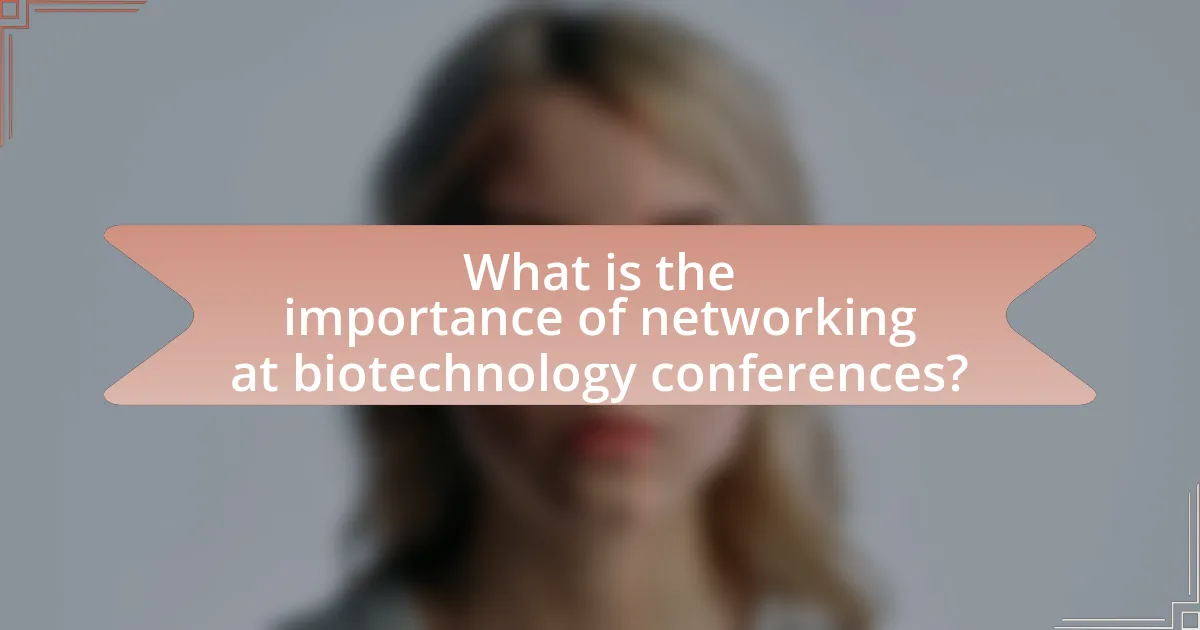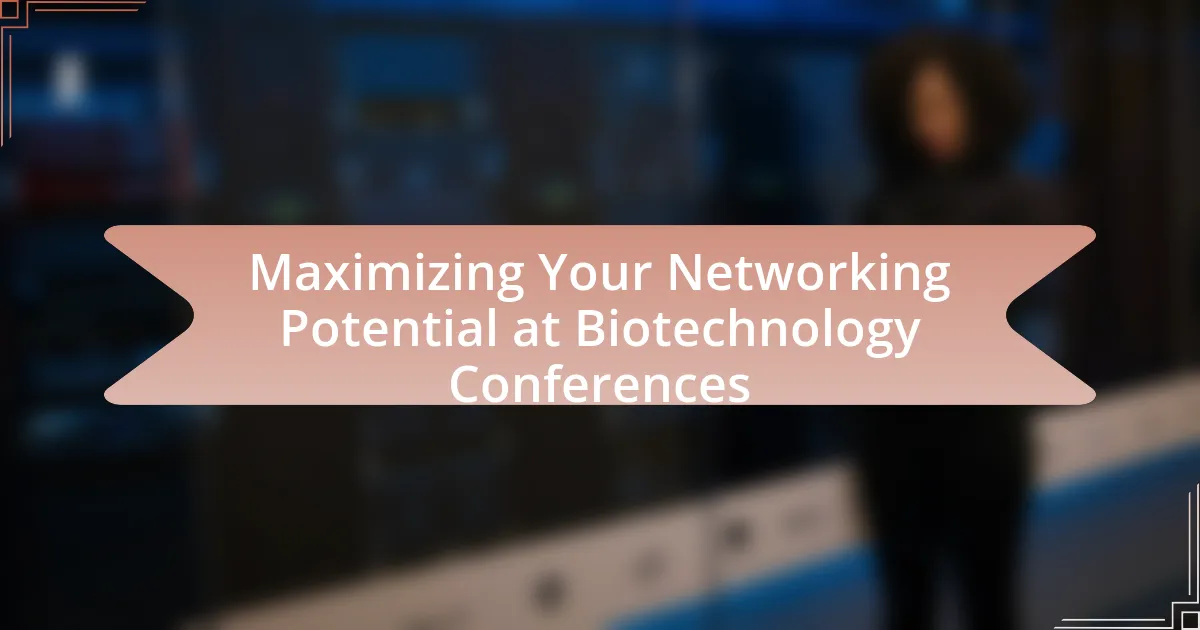The article focuses on maximizing networking potential at biotechnology conferences, emphasizing the critical role of networking in fostering collaborations, advancing research, and enhancing professional opportunities within the biotechnology sector. It outlines strategies for effective networking, including preparation techniques, engagement methods during conferences, and essential follow-up actions to maintain connections. Additionally, the article highlights the unique features of biotechnology conferences that facilitate networking, the importance of knowledge sharing, and best practices to avoid common networking mistakes. Overall, it serves as a comprehensive guide for professionals seeking to leverage networking opportunities to advance their careers in biotechnology.

What is the importance of networking at biotechnology conferences?
Networking at biotechnology conferences is crucial for fostering collaborations and advancing research. These events provide opportunities for professionals to connect with peers, industry leaders, and potential partners, facilitating the exchange of ideas and resources. According to a survey by the Biotechnology Innovation Organization, 85% of attendees reported that networking was a primary reason for attending conferences, highlighting its significance in building professional relationships that can lead to funding, partnerships, and career advancements.
How can networking enhance professional opportunities in biotechnology?
Networking enhances professional opportunities in biotechnology by facilitating connections that can lead to collaborations, job offers, and access to industry insights. Engaging with professionals at biotechnology conferences allows individuals to share knowledge, discover potential partnerships, and gain visibility within the field. For instance, a study by the Biotechnology Innovation Organization highlights that 80% of jobs in biotechnology are filled through networking, underscoring the importance of building relationships in this sector. Additionally, networking can provide access to mentorship opportunities, which are crucial for career development in the rapidly evolving biotechnology landscape.
What specific career advancements can result from effective networking?
Effective networking can lead to specific career advancements such as job promotions, new job opportunities, and collaborations on research projects. Professionals who actively engage in networking often gain access to unadvertised job openings, as many positions are filled through referrals. Additionally, networking can facilitate partnerships that enhance research capabilities, leading to co-authored publications and increased visibility in the field. According to a LinkedIn survey, 85% of jobs are filled through networking, highlighting its critical role in career progression.
How does networking contribute to knowledge sharing in the biotechnology field?
Networking significantly enhances knowledge sharing in the biotechnology field by facilitating connections among professionals, researchers, and industry leaders. These interactions enable the exchange of ideas, research findings, and best practices, which are crucial for innovation and advancement in biotechnology. For instance, conferences and networking events provide platforms where individuals can discuss recent developments, share unpublished data, and collaborate on projects, leading to accelerated learning and problem-solving. Studies have shown that collaborative networks in biotechnology can lead to increased patent filings and successful product developments, demonstrating the tangible benefits of knowledge sharing through networking.
Why are biotechnology conferences ideal for networking?
Biotechnology conferences are ideal for networking because they gather industry professionals, researchers, and innovators in one location, facilitating direct interactions. These events provide opportunities for attendees to engage in discussions, share insights, and establish connections that can lead to collaborations or partnerships. According to a survey by the Biotechnology Innovation Organization, 85% of attendees reported that networking was a primary reason for attending such conferences, highlighting their effectiveness in fostering professional relationships.
What unique features of biotechnology conferences facilitate networking?
Biotechnology conferences facilitate networking through features such as targeted sessions, interactive workshops, and dedicated networking events. Targeted sessions allow attendees to engage with specific topics relevant to their interests, fostering connections with like-minded professionals. Interactive workshops provide hands-on experiences that encourage collaboration and discussion among participants, enhancing relationship-building opportunities. Dedicated networking events, often structured as informal meet-and-greets or roundtable discussions, create a focused environment for attendees to connect, share ideas, and explore potential collaborations. These features collectively enhance the networking experience by promoting meaningful interactions and facilitating the exchange of knowledge and resources within the biotechnology community.
How do the attendees at biotechnology conferences influence networking opportunities?
Attendees at biotechnology conferences significantly influence networking opportunities by creating a diverse environment for collaboration and knowledge exchange. The presence of industry professionals, researchers, and investors fosters connections that can lead to partnerships, funding, and innovation. For instance, a study by the National Institutes of Health found that 70% of attendees reported forming valuable professional relationships during such events, highlighting the importance of face-to-face interactions in building networks. This dynamic not only enhances individual career prospects but also drives advancements in the biotechnology field as attendees share insights and resources.

What strategies can you employ to maximize your networking potential?
To maximize your networking potential at biotechnology conferences, actively engage with attendees through strategic interactions. This includes preparing an elevator pitch that succinctly describes your work and interests, which facilitates meaningful conversations. Additionally, utilizing social media platforms like LinkedIn before and during the event can help identify key individuals to connect with, enhancing your networking reach. Researching speakers and participants in advance allows for targeted discussions, increasing the likelihood of establishing valuable connections. According to a study published in the Journal of Business Research, effective networking can lead to a 30% increase in professional opportunities, underscoring the importance of these strategies in achieving networking success.
How can you prepare for networking at a biotechnology conference?
To prepare for networking at a biotechnology conference, research the attendees and speakers beforehand to identify key individuals and organizations relevant to your interests. This preparation allows you to engage in meaningful conversations and establish connections that align with your professional goals. Additionally, practicing your elevator pitch and having business cards ready can facilitate introductions and leave a lasting impression. According to a study by the American Society for Biochemistry and Molecular Biology, effective networking can significantly enhance career opportunities in the biotechnology field, emphasizing the importance of preparation in maximizing networking potential.
What materials should you bring to effectively network?
To effectively network at biotechnology conferences, you should bring business cards, a professional portfolio, and a notepad or digital device for taking notes. Business cards facilitate easy exchange of contact information, which is crucial for follow-up communication. A professional portfolio showcases your work and achievements, helping to establish credibility and spark conversations. A notepad or digital device allows you to jot down important insights, contact details, and follow-up actions, ensuring you retain valuable information from your interactions. These materials collectively enhance your networking experience by making it easier to connect and engage with others in the field.
How can you research attendees and speakers before the event?
To research attendees and speakers before the event, utilize online platforms such as LinkedIn, event websites, and social media to gather information. LinkedIn allows you to view professional profiles, connections, and shared interests, which can help identify potential networking opportunities. Event websites often provide lists of speakers and attendees, along with their bios and areas of expertise, enabling targeted outreach. Additionally, social media platforms can reveal insights into speakers’ recent activities and interests, further informing your approach. This method is effective as it leverages publicly available information to enhance networking strategies at biotechnology conferences.
What techniques can you use during the conference to network effectively?
To network effectively during a conference, engage in active listening and initiate meaningful conversations. Active listening allows you to understand others’ perspectives and interests, fostering deeper connections. Initiating conversations with open-ended questions encourages dialogue and shows genuine interest in the other person’s work. Additionally, utilizing social media platforms, such as LinkedIn, to connect with attendees before and after the event can enhance networking opportunities. Research indicates that 85% of jobs are filled through networking, highlighting the importance of building relationships at conferences.
How can you initiate conversations with other attendees?
To initiate conversations with other attendees, approach individuals with a friendly demeanor and start with a simple greeting or introduction. Engaging in small talk about the event, such as discussing a recent presentation or shared interests in biotechnology, can create a comfortable atmosphere for dialogue. Research indicates that open-ended questions, like asking about their experiences at the conference, encourage deeper discussions and foster connections. This method is effective because it invites the other person to share their thoughts, making them feel valued and engaged in the conversation.
What role does body language play in networking?
Body language plays a crucial role in networking by conveying confidence, openness, and engagement, which are essential for building connections. Effective body language, such as maintaining eye contact, using appropriate gestures, and adopting an open posture, can enhance interpersonal communication and make interactions more memorable. Research indicates that nonverbal cues account for a significant portion of communication, with studies showing that up to 93% of communication effectiveness is derived from nonverbal signals, including body language. This underscores the importance of being aware of one’s own body language and interpreting others’ cues accurately during networking opportunities at biotechnology conferences.

What follow-up actions are essential after the conference?
Essential follow-up actions after a conference include sending personalized thank-you emails to contacts made, reviewing and organizing collected materials, and scheduling follow-up meetings or calls. Sending thank-you emails reinforces connections and expresses appreciation, which can lead to stronger professional relationships. Reviewing materials, such as business cards and notes, helps in retaining valuable information and insights gained during the conference. Scheduling follow-up meetings or calls allows for deeper discussions and potential collaborations, enhancing the networking experience. These actions are crucial for maximizing the benefits of networking opportunities presented at biotechnology conferences.
How can you maintain connections made at the conference?
To maintain connections made at the conference, actively follow up with contacts through personalized emails or messages within a week of the event. This prompt communication reinforces the initial interaction and shows genuine interest. Additionally, utilizing professional networking platforms like LinkedIn to connect and engage with these individuals can further solidify relationships. Research indicates that consistent follow-up increases the likelihood of maintaining professional connections, with studies showing that 70% of networking relationships are strengthened through regular communication.
What methods are effective for following up with new contacts?
Effective methods for following up with new contacts include sending personalized emails, connecting on professional social media platforms, and scheduling follow-up meetings. Personalized emails should reference specific topics discussed during the initial meeting to reinforce the connection. Connecting on platforms like LinkedIn allows for ongoing engagement and sharing of relevant content. Scheduling follow-up meetings can facilitate deeper discussions and collaboration opportunities. Research indicates that personalized communication increases response rates by up to 50%, highlighting the importance of tailored follow-ups in networking.
How can you leverage social media for ongoing networking?
You can leverage social media for ongoing networking by actively engaging with industry professionals and organizations on platforms like LinkedIn and Twitter. Regularly sharing relevant content, participating in discussions, and joining groups related to biotechnology can enhance visibility and foster connections. According to a 2021 survey by LinkedIn, 85% of jobs are filled through networking, highlighting the importance of maintaining relationships through social media. Engaging with posts, commenting thoughtfully, and sharing insights can lead to meaningful interactions and opportunities within the biotechnology field.
What best practices should you adopt for future networking opportunities?
To maximize future networking opportunities, adopt a proactive approach by preparing an elevator pitch that succinctly conveys your professional background and goals. This practice allows you to engage effectively with potential contacts, making a memorable first impression. Additionally, research attendees and speakers prior to the event to identify key individuals you wish to connect with, enhancing the relevance of your interactions. Following up with personalized messages after the event reinforces connections and demonstrates your genuine interest in collaboration. According to a study published in the Journal of Business Research, effective networking can lead to increased career opportunities and professional growth, highlighting the importance of these best practices.
How can you evaluate the success of your networking efforts?
To evaluate the success of your networking efforts, track specific metrics such as the number of meaningful connections made, follow-up interactions, and opportunities generated. For instance, if you establish ten new contacts at a biotechnology conference and subsequently engage in three follow-up meetings that lead to collaborative projects, this indicates effective networking. Additionally, assessing qualitative feedback from peers about the value of your interactions can provide insights into the impact of your networking strategy.
What common mistakes should you avoid in networking at conferences?
Common mistakes to avoid in networking at conferences include failing to prepare, neglecting follow-up, and focusing solely on personal gain. Preparation is crucial; without it, individuals may miss opportunities to engage meaningfully with others. Neglecting to follow up after initial meetings can lead to lost connections, as studies show that 80% of networking success comes from maintaining relationships. Lastly, prioritizing personal gain over mutual benefit can alienate potential contacts, as effective networking relies on building reciprocal relationships.
What practical tips can enhance your networking experience at biotechnology conferences?
To enhance your networking experience at biotechnology conferences, actively engage with attendees by preparing specific questions and topics related to their work. This approach fosters meaningful conversations and demonstrates genuine interest, which can lead to valuable connections. Research shows that personalized interactions significantly increase the likelihood of establishing lasting professional relationships, as highlighted in studies on networking effectiveness. Additionally, utilizing social media platforms like LinkedIn before and during the conference can help identify key individuals to connect with, further optimizing your networking efforts.


